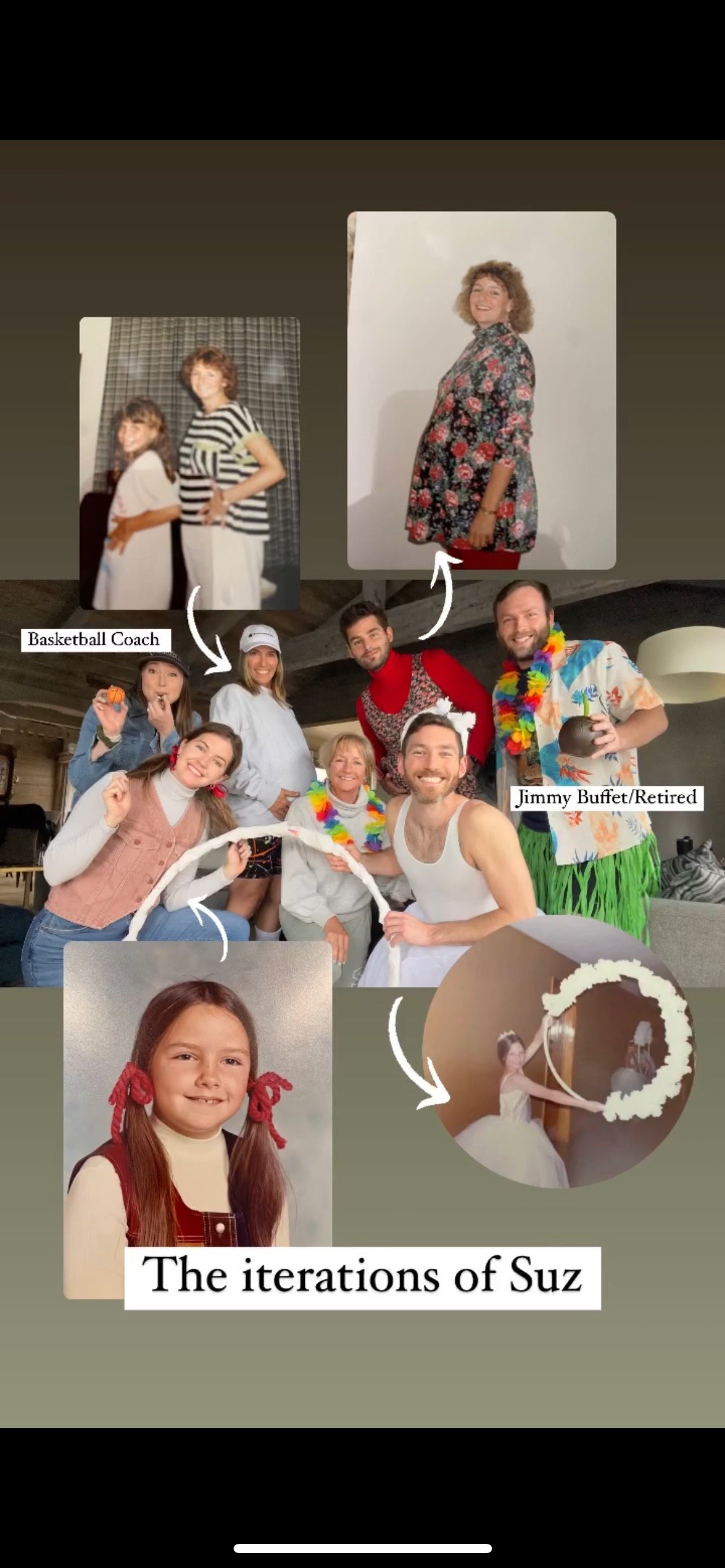The Influence Effect: The Science of Social Contagion
Aug 08, 2024I recently took a trip to Colorado with my family to celebrate my mom’s 60th birthday and my brother’s 30th. Every time I’m with these people, I’m reminded of what Warren Buffett calls the “ovarian lottery” – the random good fortune of being born in one time, place, and identity rather than another.
My family members are some of my best friends on the planet, and every time I spend time with them, I find that the better angles of my nature rise to the surface. I’m kinder, more thoughtful, and more deliberate. My sense of humor is sharper. My mood is elevated. I feel intellectually stimulated and full of energy. And after I spend time with them, it causes a ripple effect in my work and life for several weeks.

The Fam

We surprised my mom by dressing up as old photos of her

A close up of me trying dressing as my mom pregnant with me
It makes me think of the famous quote from the late, great Jim Rohn: “You are the average of the five people you spend the most time with.”
I’ve always loved that quote, but it turns out that it’s not just a clever phrase you might find in a fortune cookie; it packs a scientific punch.
Humans are social animals – we’re wired to be attuned to the emotions of others. We are so attuned, in fact, that we can take on and experience the same emotions as others. One study showed that just being in the vicinity of somebody who is stressed can impact our own nervous and endocrine systems, raising the stress hormone cortisol by upwards of 26% (Engert, Miller, Kirschbaum, Singer, 2014). Another study of nurses found that one nurse’s mood could be reliably predicted by the moods of the other nurses on the team (Totterdell, 1998).
And it’s not just our emotions that are contagious, but our behaviors too. A study out of Stanford showed that you’re 30% more likely to make an in-flight purchase if your seatmate does (Gardete 2015). Make that TWO bloody marys, please.
Another study that will get you hot and bothered showed that not only are we more likely to get a divorce if a friend gets divorced, but also if friends of your friend get divorced (McDermott, 2013). Indicating behaviors can spread throughout a social network. How wonderful...
Research connects all sorts of behaviors and conditions to other people. When a friend becomes obese, we’re a whopping 171% more likely to become obese ourselves. Heart disease, drinking, smoking, willpower, political beliefs, and work performance can all be affected by those we spend our time with.
Psychologists call this social contagion – one of my favorite areas of study in psychology.
The takeaway for leaders isn’t to avoid potlucks or only fly on private jets (although I think I’m open to both). It’s a critical concept for us to understand as leaders for a few reasons:
By understanding, acknowledging, and accepting this element of human nature, we can become more empathetic and broaden our perspective.
Being able to take the perspective of another is one of the most powerful drivers of influence. It allows us to approach our interactions with more openness, less judgment, and more curiosity.
There’s a professor out of Princeton named Robert George. George talks about an experiment he likes to conduct with his students every so often. He says, “I sometimes ask students what their position on slavery would have been had they been white and living in the South before abolition. Guess what? They all would have been abolitionists! They all would have bravely spoken out against slavery and worked tirelessly against it.”
Of course, he says this tongue-in-cheek because, in all likelihood, most of these students (and most of us) would have behaved similarly to the people who existed during those times.
It’s a powerful thought experiment that demonstrates that none of us are immune to this contagion (even though we think we are). In all likelihood, if we were thrown into another person’s situation, we would behave exactly how they would.
When we acknowledge and accept this, it opens the door to a deeper understanding of those in different circumstances. This understanding, in turn, allows us to see the broader, more interconnected picture of behavior change, fostering compassion and empathy.
Second, social contagion gives us exponential power as coaches, managers, and leaders.
As wild as some of these studies I mentioned are (my wife said, "I'm sorry, babe, that divorce one is bullshit." lol), it's important to note that social contagion doesn't spread like the flu. You won't "catch" poor behaviors by shaking somebody's hand and rubbing your eye.
Instead, behaviors spread based on the relationship. When there's a personal relationship, we put our walls down and become less defensive, opening us up to the contagious effects.
Research on therapists shows the most predictive indicator of effective therapy isn't the methodology or education of the therapist but the relationship between therapist and patient.
Now, relationships can happen naturally through emotional intensity, intimacy, and reciprocity invested into a relationship, but they can also develop in a few other ways pertinent to us as leaders.
Authority: Being the therapist, coach, or manager instantly puts us into a relationship dynamic with our people. As the expert or authority, not only do we have social contagion working for us, but we're also in a hierarchical position that naturally gives us power and influence. This essentially puts social contagion on steroids.
Proximity + Time: Due to the mere exposure effect – the idea that familiarity leads to liking – simply spending time with people will develop the relationship. A study from the Maryland State Police Academy found that seating proximity in training classes was a stronger predictor of friendship than religion, age, hobbies, and marital status. Other research by Jeffrey Hall out of the University of Kansas (Rock Chalk, baby) found that you can kind of put a shot clock on friendship:
50 hours 👉 acquaintance to casual friend
90 hours 👉 casual friend to real friend
200 hours 👉 real friend to close friend
As managers, we'll hit this in a few short months. As coaches, being top of mind every week will naturally develop the relationship, allowing us to tap into social contagion and influence our people.
All this is to say that social contagion combined with leadership is extremely powerful.
A mentor once taught me, "As a leader, your covert communication is always being received."
The burden of the leader is that they don't get to fly under the radar. Everything you say (or don't say) will be picked up on and internalized.
When we're stressed, our team will become stressed.
When we're fearful, our team will become fearful.
When we are annoyed, our clients will feel that frustration.
The luxury of the non-leader is that they can get away with lacking integrity, poor emotional regulation, or not delivering consistently. As leaders, you don't get the benefit of the doubt.
But the upside is that when harnessed, social contagion gives us tremendous power and influence to make a difference in the lives of others. And that's why we do what we do.
SUBSCRIBE FOR WEEKLY LEADERSHIP LESSONS
Get Tools, Strategies, + Insights to Be a Great Leader Directly to Your Inbox Every Friday.
We hate SPAM. We will never sell your information, for any reason.
